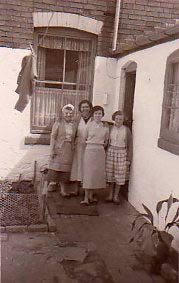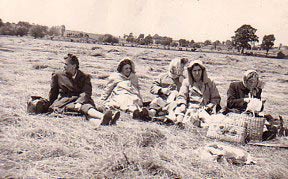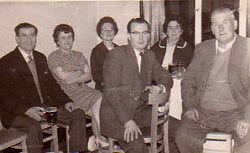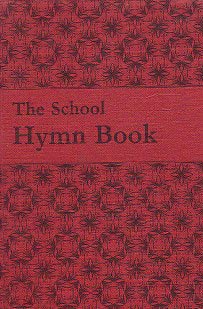Sutton Street by Norma Wooding
t was a hot summer's day as a heat wave swept through the British Isles as adolph Hitler was trying to destroy our country and Birmingham was being hard-hit from the aerial bombing campaign. The date was June 17th, 1941 and my mother, Maud Knight, was about to give birth to her second daughter in the front room of 90 Sutton Street, located just off Park Lane. Because it was so hot, neighbors had loaned her fans to try to help to keep cool.

after a short time, I arrived in this world and this was the beginning of my 22 years living in this tight knit community, which was located close to aston cross. as I began to grow up, my most vivid memories of growing up this part of aston, was belonging to an extended family. Our rented house was three-stories high, containing two attics, two bedrooms, a front room, living room, kitchen and cellar used for our coal supply, which was delivered by Bertha, the coal lady who would bring it around in a wheelbarrow and empty it down the iron grate.
My memories of Bertha were that she always wore dark clothes, wrap around apron and a beret. although covered in coal dust a large part of the time, she was such a happy, joyous character. There was no bathroom in our house and the toilet was outside and constantly stocked up with cut up newspapers that became our toilet rolls. Bath night for our family was usually a Friday night when we would drag in a big tin bath and then boil water on the gas stove until we had enough, and then, one by one, in from of the coal fire, we would take our bath.

One of the attics became my bedroom and in summer it was baking hot and in the winter, it was so cold that icicles would grow on the one tiny window. Neighbours became my aunts and uncles and were always there for me, helping me with all kinds of things. "Uncle Ernie" would help me with my arithmetic for school - Burlington Street School. Ernie's family was the first family in our tiny area to acquire a television set. It was a 9-inch black and white model and I would go around there and watch Muffin the Mule and other children's programs.
My special friend was a neighbor called Hilda, who was the local dressmaker. She taught me to knit and sew and I spent many hours each week in her home. Each Sunday, I would have my Sunday lunch with her and her Welsh-born husband, Joe. Years later, she made my wedding and bridesmaids dresses. Hilda, after we had lunch, would send me to Sunday School at the local Gospel Hall in Park Lane. This was my introduction to spiritual things, which later became very important to me. Recreation for my Mom and Dad - Howard and Maud - would mainly be at the The Eagle, a pub on the corner of Sutton Street and Park Lane.
My Dad would play darts and dominos there with the men and the women sat together chatting. as the evening would go on, many would start singing the hits of the day. My Dad was also a keen fisherman and one of the highlights of growing up was to go on fishing day trips on a coach with lots of other local families. In those days, no one locked their doors during the day and I had freedom just going in and out of all the different homes.

as I got a little older, one of my jobs was to run errands to aston cross to get things like grease-proof paper for "Robbo" who was Mrs. Robinson, who ran the local café called "Robbo's café" on Park Lane, which specialized in sausage sandwiches, bacon sandwiches, tea, coffee and toast. Never since those days, have I ever tasted sausage and tomato sandwich like you could get from "Robbo's café."

another job I did to earn some pocket money was to help Mrs. Goodwin, who had another store on Park Lane that sold sweets, bread, ice cream and general food items. But also she would cater for local weddings and other parties. I would help by being a waitress at some of these events with my sister, Eileen and sometimes my Mum. We would have to prepare all the food at the shop and then take it to wherever the parties were being held.
I finally left aston on July 13th 1963 when I married Dan Wooding, now a journalist, at aston Parish church, close to Villa Park. We now have two sons, andrew and Peter, and their lovely wives, alison and Sharon, and six grandchildren who all still live the UK. One of my recent fondest memories was visiting my old school - Burlington Street - with a school chum of those days, Valerie, and being allowed by one of the demolition men who was knocking it down, to have a tour of what was left of this fine school. I was able to pick up from the floor an old hymnbook, which I now treasure.